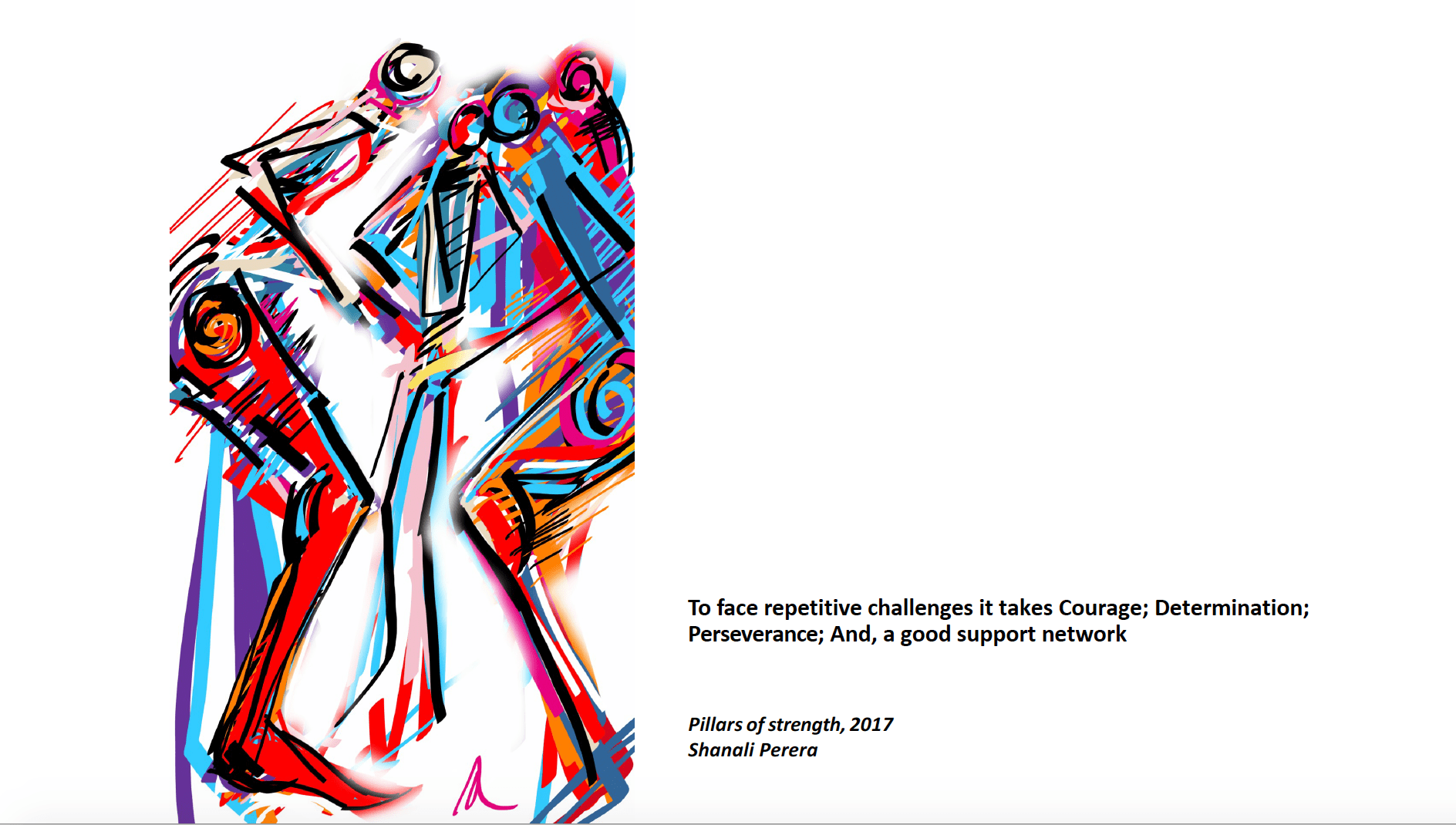In the first part of a two-part blog, Brian Devlin, Ceri Dare, Genna White and Olivia Fulton, the four Cochrane UK Consumer‘Consumer’ is Cochrane’s preferred term for patients (or someone with personal experience of a health condition), care-givers or family members of someone with a health condition. (https://consumers.cochrane.org) Champions, and Emma Doble, Cochrane UK’s Patient and Consumer Coordinator, reflect on the daily burden of work that comes with living with a long-term condition, how they’ve managed during the pandemic, and sources of information and support they find useful. Featured image: Pillars of Strength by Shanali Perera*
About Brian, Ceri, Emma, Genna and Olivia
Brian Devlin – I am profoundly deaf. I manage well with bilateral Bone Anchored Hearing Aids. Three years ago, I had a stoma as a consequence of decades of fistula and abscesses. I am a retired NHS Director of Public Relations and have an academic background that includes healthcare ethics.
Ceri Dare – I have a long history of mental health problems, with a diagnosis of schizoaffective disorder. A few years ago, I developed adult-onset difficult asthma. Trying to juggle medications and treatmentSomething done with the aim of improving health or relieving suffering. For example, medicines, surgery, psychological and physical therapies, diet and exercise changes. for both is surprisingly difficult. I enjoy running, crafts, and roleplaying games.
Emma Doble – I was diagnosed with Type 1 diabetes at the age of 4. I am a consumer engagement coordinator at Cochrane UK working on the consumer champions project and I am also a patient editor at the BMJ.
Genna White – I am a parent of a child with a developmental communication disorder, a final year speech and language therapy student and a Cochrane UK Consumer Champion.
Olivia Fulton – I have lived with severe asthma all my life. Since asthma started to dictate more of my life, I have become involved heavily with patient and public involvement (PPI) in research, specifically asthma or critical care research as well as teaching PPI. I am also a patient advocate for people with severe asthma and help run an Intensive Care Unit (ICU) support group for people post-ICU.
Living with long-term conditions comes with a daily burden of work. How do you manage this?
Emma – Take it one day at a time. If I have had a difficult day with my blood sugars I try to not worry about it and take tomorrow as a new day and a fresh start. I also try to listen to my body and take some time to rest if I am struggling.
Brian – I’m very much the same with my stoma. By and large, it has improved my quality of life tremendously – but sometimes things go wrong. I’ve learned to just re-group mentally and try again.
Ceri – Doing things which help my physical and mental health takes time and energy, but I know that if I don’t do them, I will get stuck in vicious circles which are increasingly difficult to escape from. I have to prioritise staying well above anything else because, without that, everything else will soon fall over. There’s a ‘second shift’ of work which is trying to negotiate and advocate for the healthcare and support I need.
Genna – Managing someone else’s needs and support requirements can feel like a full-time job, so I try to stay organised like I would if it were an actual job. I make a plan of what I would like to achieve each day and set reminders for myself. This approach also helps me manage all the worries and emotions that come with raising a child with a disability. I also try and get lots of sleep!
Brian – Sometimes it overwhelms me that my ability to communicate with the outside world depends on two bits of highly specialised kit which are attached to my skull through titanium poppers. I need them to work. And sometimes things go wrong. And yes it can be tiring and stressful and even frightening sometimes being deaf. Deafness is a long-term condition that, like all of us, is largely invisible. So people find it difficult to understand.
Olivia – I have never known life any different but it is a balancing act. A routine helps me with my medication management. I have to take regular medication throughout the day so not having a routine can mean I forget things. Being prepared and having rescue medication in case of exposure to triggers. Pacing is one of my biggest tools and knowing how much I can handle and how much recovery I need for each activity too.

What impact has the pandemic had on how you manage your long-term condition?
Emma – Many of my check-up appointments have been cancelled or delayed. This has included things like my eye screening which has been worrying. When appointments have been rearranged they have all been on the phone or video consultation. I have found talking about areas I am struggling with on the phone quite challenging but since I have been able to have appointments on video this has been easier.
Ceri – I’ve been shielding due to ‘difficult’ asthma and I’ve been terrified of being sectioned throughout the pandemic because I am extremely clinically vulnerable to COVID-19. I haven’t been able to attend support groups for a year now. In summer, being on a mental health ward was difficult; I had to spend most of my time alone in my room. I also had diagnostic procedures, a course of physiotherapy, and referrals cancelled.
Genna – The first lockdown was particularly hard as my son was out of school and unable to attend his usual activities. This really affected his mental health and his behaviour which made our home life very challenging. It highlighted the level of support my son needs and how much the rest of us need periods of respite.
Brian – My wife and I think we got COVID-19 in March 2020. One morning I had what I thought was a bad asthma attack that developed into something much more severe than I’d ever had. The cough was relentless. I thought ‘I feel I could die right now.’ The cough affected stoma production and hydration was a challenge. I found managing both the physical and mental health aspects of my long-term conditions harder due to that experience.
Olivia – The pandemic has had a big impact on me. I have had to shield, I live on my own so decided to move home to my parents. I have been very cautious with managing my health as a friend with severe asthma died from COVID, so I have been hypervigilant as a result. I minimise what I do so I don’t exacerbate my asthma in case I end up needing to go to hospital.
What sources of information or support have you found particularly useful?
Emma – I find peer support groups on social media helpful for support and information on coping with Type 1 Diabetes. Hearing that other people are having the same struggles as me is reassuring and helps me know that I am not alone.
Genna – Peer support groups in real life and on social media and individual professionals.
Ceri – Talking to other people with similar experiences, and the disabled people’s movement more widely. My church, who valued me when the rest of the world didn’t seem to.
Brian – I have got really good relationships with my colorectal and ENT (ear, nose, and throat) consultants. This helps terrifically. But as the others have said, peer support is so important for me. I couldn’t manage without it.
Olivia – My team are probably my biggest source of information but also the charities associated with my conditions as well. They are really supportive and have given me some great resources as well as putting me in touch with great professionals and people with the conditions too.
Brian, Ceri, Genna, Olivia and Emma have nothing to disclose.
*Shanali Perera is a contemporary artist, educator, activist, retired Rheumatologist, living with Vasculitis. She works across the intersections of art, health, medical education and patient support: https://www.changinglanes.me/


